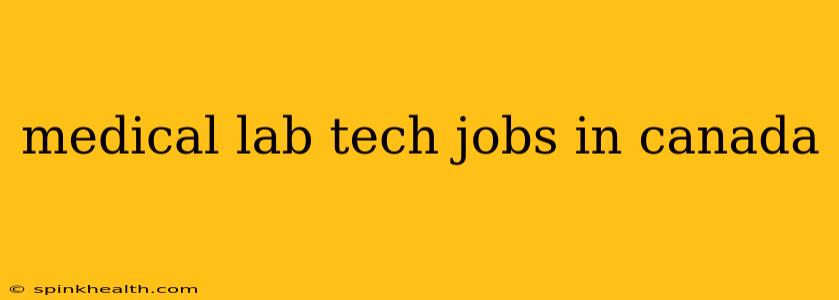Charting a Course: A Medical Lab Technologist's Journey in Canada
Canada, a land of breathtaking landscapes and robust healthcare systems, offers exciting opportunities for medical lab technologists (MLTs). If you're considering a career or a move to Canada in this field, you're in the right place. This guide navigates the pathways, challenges, and rewards of being a medical lab technologist in the Great White North.
My journey into this world began with a fascination for the unseen – the microscopic battles waged within the human body. From dissecting frogs in high school biology to marveling at the intricate processes of cellular function, my path was clear. But embarking on a career as an MLT in Canada required planning, dedication, and a touch of good fortune.
What are the job prospects for medical lab technologists in Canada?
Canada's aging population and the increasing demand for sophisticated medical diagnostics mean the job outlook for MLTs is exceptionally positive. Hospitals, private labs, and research facilities across the country are constantly seeking skilled professionals. The field is not only growing but also diversifying, offering opportunities in specialized areas like genomics, microbiology, and immunology. This isn't just about running tests; it's about being at the forefront of medical advancements, impacting patient lives directly.
What qualifications do I need to work as a medical lab technologist in Canada?
This is where the journey gets a bit more nuanced. Canada doesn't have a single national licensing body for MLTs. Each province and territory has its own regulatory authority, meaning the specific requirements vary. Generally, you'll need:
- A recognized educational credential: This usually involves a college or university program accredited by your province's regulatory body. These programs are rigorous and demanding, encompassing both theory and extensive practical training.
- Successful completion of a licensing exam: Once you've finished your education, you'll need to pass a licensing exam to be eligible for registration and practice in your chosen province. These exams assess your knowledge and skills thoroughly.
- Registration with the provincial regulatory body: This is the final step – becoming officially registered as a medical lab technologist in your province or territory.
What is the salary range for medical lab technologists in Canada?
Salaries vary across provinces and depend on experience and specialization. However, MLTs in Canada generally enjoy competitive compensation packages. You can expect a comfortable salary, along with benefits including health insurance, pension plans, and paid time off – all contributing to a strong work-life balance.
How can I immigrate to Canada as a medical lab technologist?
Immigration to Canada as an MLT typically involves demonstrating that you meet the requirements of one of Canada's immigration programs. This often entails proving your qualifications are recognized in Canada, having a job offer, and meeting the necessary language proficiency requirements. The process is detailed, and exploring the options with a qualified immigration consultant is highly recommended. It's a journey requiring patience and thorough preparation.
What are the different types of medical lab technologist jobs in Canada?
The beauty of being an MLT lies in the breadth of opportunities. Within the labs themselves, you could specialize in areas such as hematology (the study of blood), clinical chemistry (analyzing body fluids), microbiology (identifying infectious agents), immunology (studying the body's immune response), or blood banking (managing blood transfusions). Beyond traditional lab settings, there are opportunities in quality control, research, and even teaching.
What are the job duties of a medical lab technologist in Canada?
Your day-to-day responsibilities will vary depending on your specialization, but generally involve collecting samples, performing tests, analyzing results, ensuring quality control, maintaining equipment, and often interacting with other healthcare professionals. You are a crucial part of the diagnostic process, delivering results that inform treatment decisions.
My own journey has been a rewarding one, filled with intellectual challenges, moments of discovery, and the immense satisfaction of contributing to improved patient care. The Canadian healthcare system values its MLTs, and the opportunities for growth and development are plentiful. If the world of medical laboratory science fascinates you, Canada offers a welcoming and fulfilling environment to build a successful and meaningful career.

